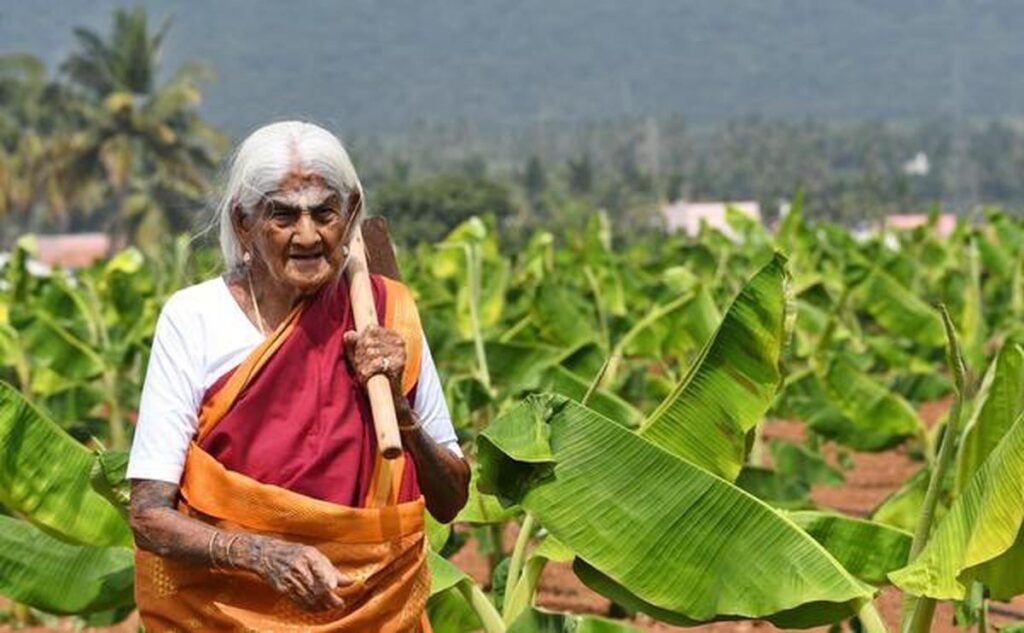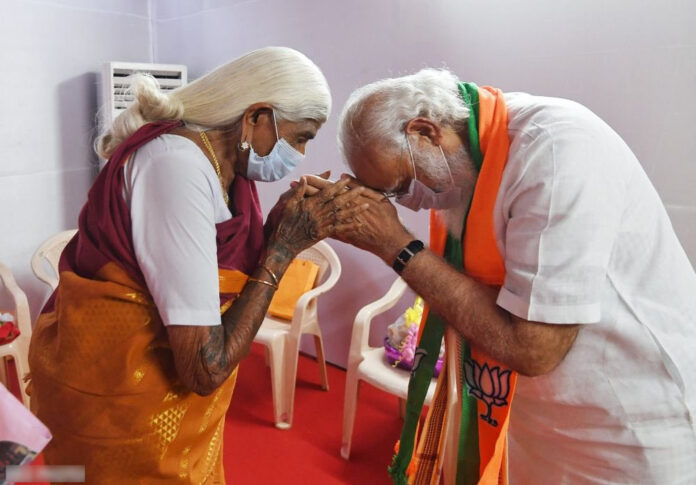Nature does not repeat itself. Nor will Pappammal. “One crop at a time” farming evangelist, never repeated the crop in about 90 years she spent tilling on her farm at Coimbatore in Tamil Nadu. On Friday, 27 September 2024, she died of age related illnesses. She was 110.
At the age of 105, she was said to be the longest working farmer on the planet.
Hearing her demise, Prime Minister Narendra Modi took to Twitter (now X) and condoled her death, posting a picture from the past of Pappammal blessing him. “Deeply pained by the passing away of Pappammal Ji. She made a mark in agriculture, especially organic farming. People admired her for her humility and kind nature…,” Modi wrote.
Born to Velammal and Maruthachala Mudaliar in village of Thekkampatti, Coimbatore in 1914, she lost her parents early. She and her two sisters were raised by grandparents. They inherited a shop and started an eatery. From the earnings she brought a piece of land in the village and started farming.
From then on, Pappammal was familiar sight for almost 90 years with a shovel on her shoulder at her farm, carefully treading, tilling, tending her crop, planting seeds and pulling weeds.
Pappammal left behind a legacy of sustainable agriculture and was a trailblazer in her own right. For her, farming was not just an occupation but a way of life, a means to sustain community and the nature.
Her life was defined by humble beginnings and steeped in traditional agricultural practices from an early age. As a young girl working in the fields, she absorbed the ancient farming wisdom passed down through generations.

Pappammal’s life spanned two world wars, pre- and post-independence India. Sweeping changes in agricultural technology did not deter her from treading nature’s path, she remained committed to chemical-free, natural way of farming. “Nature knows what it needs. You just have to listen to it,” she often used to say.
The word “organic” came much later. Her methods, rooted in traditional knowledge, were to keep the soil fertile through natural composting, crop rotation, and chemical-free cultivation. Pappammal did not rely on machinery or modern technology; instead, she followed the rhythms of nature.
She believed in the power of the nature, seasons and cycles, and intuitively knew natural practices could provide healthier, more sustainable food for future generations.
Her farm produced a wide variety of crops, grains like millet and pulses, along with vegetables and a variety of fruits. She was particularly known for cultivating traditional millet varieties, a practice she maintained long after the crop fell out of favour with ushering of large-scale mechanized farming. In a world increasingly reliant on hybrid seeds and chemical interventions, Pappammal’s farm was an oasis of biodiversity, demonstrating how traditional methods could stay afloat amid modern technological and market challenges.
A true-blue Tamalian, Pappammal was proud of her Dravidian identity. She was acutely conscious of threat to her mother tongue Tamil from Hindi chauvinists from North who wanted impose Hindi on Tamils. She participated in Anti-Hindi agitations of 1960s in the state. She was active in public life, joined protests against NEET medical entrance exams and participated in the DMK’s Mupperum Vizha just days before her death, where she received the Periyar Award.
Her work as rural woman farmer earned her many accolades, including the prestigious Padma Shri in 2021 for her contributions to sustainable agriculture. She was on board of Tamil Nadu Agricultural University, regularly invited as a guest lecturer, where she shared her invaluable insights on organic practices with students, scholars and experts in modern agriculture.
Pappammal was always humble, often reminding, “I’ve learned from the earth, and I’ll teach others the same.” This ethos of sharing knowledge was central to her legacy as she mentored countless young farmers and encouraged them to adopt natural farming.
As mankind continues to live on from generation to generation, as more and more humans and earth get soaked with poison from pollution, as late-age diseases like heart attack and stroke hit young and younger by the day, how many of us can even can think of having a life like hers?
Even in last years of her life, Pappammal was working in fields at age of 105. She suffered no known life-threatening disease and died of only age-related infirmities.
Therefore, there will not be other, who will live and die like Pappammal.



